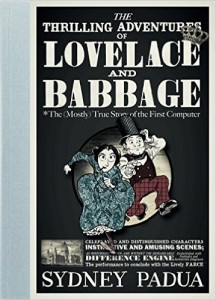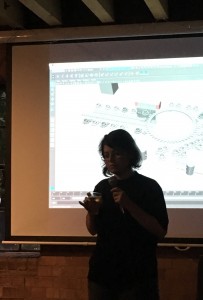For August’s Skeptics in the Pub, we’re joined by Sydney Padua, Hollywood artist who has worked on films such as the recent Jungle Book live-action remake. She also draws a successful web-comic, which has recently been turned into a book and so she has come to tell us all about Imaginary Engines – The Thrilling Adventures of Lovelace and Babbage.
Ada Lovelace was the only legitimate child of Nottinghamshire legend Lord Byron. When she was one, her mother fled the marriage and was worried that her daughter might follow in Byron’s footsteps. So, Ada was taught mathematics from a young age to counter Byron’s “wild blood” – maths was seen as the anti-poetry.
Charles Babbage held the Lucasian Chair at Cambridge (previously held by Isaac Newton and currently occupied by Stephen Hawking) although he never actually delivered a lecture. He was obsessed with creating an automatic calculating machine. His first design, the Difference Engine was only built for the first time in 2000, Babbage only left plans. While it was built with modern tools, it worked without lubrication and so should have worked if Babbage could ever have made one. His next design, the Analytic Engine was seen as a machine eating its own tail as it could use its results in subsequent calculations. It had a processor and a memory and was essentially the first computer. It was going to be built from brass and powered by steam.
In 1833, when Lovelace was 18, she first met Babbage, who was 42, and she fell in love… with his machine. She asked him for the blueprints. In 1842, she wrote the first ever paper on computer science – Babbage never published anything on his inventions. He had given a talk and this had been written up by an Italian. This was translated into French and then Lovelace translated it into English. She also added footnotes, and these were three times longer than the actual paper.
Lovelace was a big fan of symbolic logic and wanted the machine to work in this field as well. 100 years later Alan Turing wrote On Computable Numbers, essentially codifying her ideas into a general theory of computing. He even referred to her by name in one of his papers, although he claimed that the Lovelace Conjecture was a fallacy to which mathematicians were especially prone. However, Lovelace died of cancer at 36. In his later years, Babbage became the scourge of London’s street musicians before dying a bitter man leaving thousands of plans.
Lovelace was a bit of a nerd at parties and one of her former teachers wrote a letter to her mother stating his fear that she may go mad from learning mathematics. Clearly the Victorians didn’t consider mathematics suitable for a young lady and she was considered one of the most vulgar women in England.
Meanwhile Babbage was given £12,000 by the government to produce a Difference Engine – at the time this was enough money to build two warships. One of the reasons that it was never finished was that he was continually changing his designs. He saw it as a machine to compute incredibly difficult arithmetic – up to 50 digit numbers but he was always complaining about how difficult it was to describe his machine to others.
The program that Lovelace wrote for the Analytic Engine would have taken eight hours to run but it would have been completely error free. This was Babbage’s dream – error free calculations. His machine even had an error pop up – a plate with the word “wrong” on it would appear out of the machine. He even coded a continually ringing bell to alert the user to an error. No model of the Analytics Engine has ever been produced although Plan 28 have a goal to build one.
At the time Lovelace and Babbage were incredibly famous. They were brilliant characters – ideal to be turned into a comic book. So Sydney imagined what would history have been like if they’d actually built their machine and used it… to fight crime!
For more information of The Thrilling Adventures of Lovelace and Babbage check out Sydney’s website: http://sydneypadua.com/2dgoggles/
Nottingham Skeptics in the Pub returns to The Canalhouse on the 6th of September at 7:00pm where Katherine Woolf will be talking about “Game of Clones – Why should we care if our friends are similar to us?” For more information visit the SitP website: http://nottingham.skepticsinthepub.org/
By Gav Squires
@GavSquires





